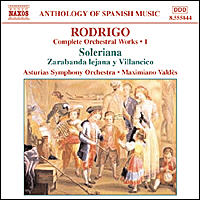Diphtheria left Joaquín Rodrigo blind from the age of four, and this would mark his inclination to cultivate his inner world and then dedicate himself completely to music. In 1906 his family moved to Valencia, where Rodrigo had his first musical instruction in the Blind College. It was hearing Verdi’s Rigoletto that convinced him of his vocation as a composer. His first works were written in 1922 and two years later his orchestral Juglares was performed. It was at this time that he came into contact with the group of avant-garde composers in Madrid, a stage that came to an end when in 1925 he failed to win the Premio Nacional de Música, moving then to Paris, where he came to know Dukas.
During the Spanish Civil War his Concierto de Aranjuez was performed, with the guitarist Regino Sáinz de la Maza as soloist, his definitive achievement as a composer. During the years of General Franco’s dictatorship Rodrigo’s work represented Spanish music abroad, at least until the entry on the scene of the innovative Generation of 51. The performance in San Francisco in 1958 of the Fantasía para un gentilhombre (Fantasia for a Gentleman) by its dedicatee, the guitarist Andrés Segovia, would mark the culmination of his international reputation.
Orchestral Works Vol.1
